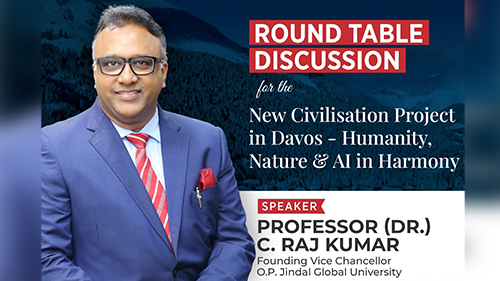
The Vice Chancellor of O.P. Jindal Global University (JGU), Professor (Dr.) C. Raj Kumar, will be speaking at the World Economic Forum (WEF) 2025 in Davos, Switzerland to be held during 20-24 January 2025.
Jindal Global Law School
| Room No | |
| Languages | English Hindi |
| Key Expertise |
Professor Kumar will be speaking at the Round Table discussion for the New Civilization Project in Davos organised by Purpose Driven Innovation Ecosystem (PDIE) Group to be held on Monday, 20 January 2025 at 12:30 pm CET (5:00 pm IST).
In an era of unprecedented scientific and technological advancement, the theme of building a new civilisation calls for a profound rethinking of our relationship with humanity, nature, and artificial intelligence (AI). Professor Kumar’s talk will explore how education and sustainable development can become the pillars of a harmonious future where human aspirations align with the ecological realities of our planet.
Education, reimagined for the 21st century, must go beyond traditional knowledge transfer to foster interdisciplinary learning, holistic thinking, empathy, and an understanding of interconnectedness. It should empower individuals to integrate ethical considerations and environmental stewardship into their decisions. Professor Kumar will argue that this paradigm shift in learning will prepare societies to embrace Sustainable Development Goals (SDGs) as a collective mission.
Professor Kumar will observe that Sustainable Development provides a practical framework for addressing critical global challenges, including climate change, biodiversity loss, and resource inequality. When guided by an ethical and human-centric AI, these initiatives can be amplified to achieve deeper and faster results. AI has the potential to act as a bridge between humanity’s aspirations and nature’s limitations by enabling smarter resource management, predictive ecological modeling, and equitable decision-making.
Professor Kumar’s talk will highlight AI as a collaborator rather than a disruptor, emphasizing its role in scaling solutions for education, reducing environmental impact, and fostering innovation that respects natural ecosystems. By harmonizing human ingenuity with the wisdom of nature and the computational power of AI, we can envision a new civilisation where technological progress is not at odds with the planet but rather a force for sustainable co-existence. This vision calls for collective responsibility and a global commitment to a future that respects the delicate balance of humanity, nature, and AI, making it not just aspirational but achievable.
Professor Kumar has recognised that the advent of artificial intelligence (AI) has ushered humanity into a transformative era, offering unparalleled opportunities to address global challenges. Yet, the question remains as he asks and attempts to answer: can we build a new civilisation where humanity, nature, and AI coexist in harmony? This talk explores how education, sustainable development, and robust legal and regulatory frameworks can collectively enable this vision.
Education serves as the cornerstone of this new civilisation. By fostering systems that emphasize holistic learning, critical thinking, and ethical decision-making, education can prepare individuals to navigate the complexities of a world driven by AI. Curricula must integrate ecological awareness, sustainability principles, and the moral dimensions of technology, ensuring that future generations are equipped to align human aspirations with the realities of nature.
Sustainable Development provides a practical roadmap for this transformation. By adopting AI-driven solutions—such as precision agriculture, resource optimization, and environmental monitoring—we can accelerate the achievement of global sustainability goals. AI, when used responsibly, can bridge the gap between humanity’s ambitions and nature’s capacity, enabling smarter and fairer decision-making and equitable resource distribution. However, as Professor Kumar underscores in his talk, achieving harmony requires more than aspirations; it demands law and regulation to create accountability, enforce responsibilities, and prevent misuse.
A robust legal framework can ensure that AI operates transparently and ethically, safeguarding human rights, biodiversity, and planetary health. Regulations must hold governments, corporations, and individuals accountable for the impact of their actions on nature and society. Laws can promote sustainability by incentivizing green technologies, enforcing environmental protections, and fostering international collaboration to address global challenges.
This talk argues that the integration of AI into the fabric of society must be guided by enforceable standards that balance innovation with ethical responsibility. By combining education, sustainable development, and effective legal systems, we can transform the aspiration of harmony between humanity, nature, and AI into an actionable reality—paving the way for a civilisation that thrives in balance with its environment.
PDIE Group, the host of this Round Table at Davos, builds global innovation ecosystem for sustainable entrepreneurs, corporations, investors and researchers to solve the world's greatest challenges. This Round Table is designed to bring together influential leaders and innovators to exchange perspectives on shaping a resilient and forward-thinking global society.
The World Economic Forum (WEF) convenes annually in Davos, Switzerland to bring together global leaders from all walks of life to address key global and regional challenges. The WEF Annual Meeting 2025 convened under the theme, “Collaboration for the Intelligent Age” will bring together around 3,000 leaders from over 130 countries - demonstrating the critical need for dialogue in an increasingly uncertain era. 350 governmental leaders, including 60 heads of states and governments, from all key regions will gather in Davos-Klosters to address pressing challenges and shape emerging opportunities.
| Published Date | 20-01-2025 |
| Category | Events |